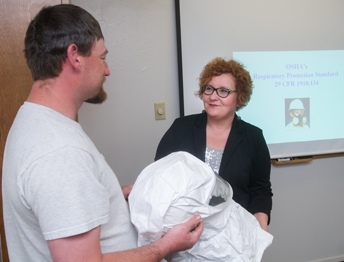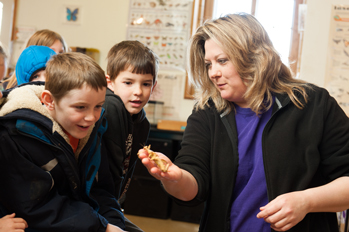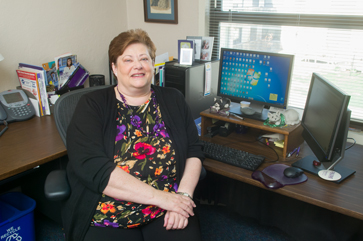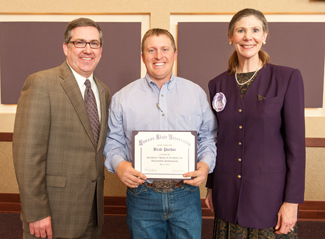May 10, 2013
Rewarded and recognized: Unclassified employees earn honors for excellence
Submitted by Communications and Marketing
The Kansas State University president's office is recognizing four unclassified professionals for achieving excellence in their contributions to the university.
Receiving the 2013 President's Award of Excellence for Unclassified Professionals are Sandra Hoffman, director of facilities resources in the Division of Facilities; Kiffnie Holt, insect zoo coordinator in the department of entomology; Bettie Minshall, program coordinator in the Division of Continuing Education; and Brad Purdue, horse unit manager in the department of animal sciences and industry.
The award was established to foster excellence in the workplace by rewarding and recognizing unclassified professional staff who achieve excellence or make exemplary contributions to the mission and values of Kansas State University through service as a team player, exceptional productivity, creativity or innovation, distinguished accomplishment or leadership.
 Hoffman, selected for the unclassified award in the team building, group activity and service category, is affectionately known as "Safety Sandy." She has implemented the Occupational Safety and Health Administration, or OSHA, Four Point Workplace program to improve worker safety, which has led to a 63 percent reduction in work-related accidents since the program was implemented in 2008. She has help train staff at the Division of Facilities to recognize unsafe situations and to avoid them. Also, Hoffman created a Quest for Excellence Team that provides division staff with the opportunity to make a difference in the workplace. Nominated by Loleta Sump from the Division of Facilities, Hoffman is described as a team builder, creative, well respected by her peers and an effective leader at the university.
Hoffman, selected for the unclassified award in the team building, group activity and service category, is affectionately known as "Safety Sandy." She has implemented the Occupational Safety and Health Administration, or OSHA, Four Point Workplace program to improve worker safety, which has led to a 63 percent reduction in work-related accidents since the program was implemented in 2008. She has help train staff at the Division of Facilities to recognize unsafe situations and to avoid them. Also, Hoffman created a Quest for Excellence Team that provides division staff with the opportunity to make a difference in the workplace. Nominated by Loleta Sump from the Division of Facilities, Hoffman is described as a team builder, creative, well respected by her peers and an effective leader at the university.
 Holt was selected for the unclassified award in the productivity, creativity and innovation category. She has used her creativity and innovation in developing displays and programs at the Insect Zoo. Under Holt's management, the Insect Zoo has become a self-sustaining nonprofit enterprise. She was nominated for the award by John Reese, professor of entomology, for her success in garnering external funding and developing infrastructure for education; encouraging undergraduate and graduate education through work and volunteer experiences; integrating service learning for students in multiple units across campus; and committing to community and science education through K-12 outreach.
Holt was selected for the unclassified award in the productivity, creativity and innovation category. She has used her creativity and innovation in developing displays and programs at the Insect Zoo. Under Holt's management, the Insect Zoo has become a self-sustaining nonprofit enterprise. She was nominated for the award by John Reese, professor of entomology, for her success in garnering external funding and developing infrastructure for education; encouraging undergraduate and graduate education through work and volunteer experiences; integrating service learning for students in multiple units across campus; and committing to community and science education through K-12 outreach.
 Minshall was selected for the unclassified award in the distinguished accomplishment category. She facilitates credit program offerings from agriculture; architecture, planning and design; and veterinary medicine. She serves as the coordinator for seven degree programs through the Division of Continuing Education, and six certificate programs. Minshall has taken the lead with various division and university endeavors, including serving on a project team to develop a wiki for distance learning faculty development, developing online resources for distance faculty, and working to increase faculty services and professional development at the university. Nominated by Sue Maes, dean of the Division of Continuing Education, Minshall is described as a leader, advocate and visionary both on campus and in the field of continuing education.
Minshall was selected for the unclassified award in the distinguished accomplishment category. She facilitates credit program offerings from agriculture; architecture, planning and design; and veterinary medicine. She serves as the coordinator for seven degree programs through the Division of Continuing Education, and six certificate programs. Minshall has taken the lead with various division and university endeavors, including serving on a project team to develop a wiki for distance learning faculty development, developing online resources for distance faculty, and working to increase faculty services and professional development at the university. Nominated by Sue Maes, dean of the Division of Continuing Education, Minshall is described as a leader, advocate and visionary both on campus and in the field of continuing education.
 Purdue, selected for the unclassified award in the leadership category, was recognized for his work advancing the university's mission of teaching, research and service. He teaches Advanced Horse Training and Management and conducts research at the horse unit. Nominated by Teresa Douthit, assistant professor of animal sciences and industry, Purdue is described as a person who leads by example and makes a difference by interacting with students, faculty, staff and clientele. He has changed the culture of the horse unit to be very open and inclusive. He has worked hard to reduce expenses and increase income by seeking donations of both services and products, creating more marketable horses and reducing the herd number to a manageable level.
Purdue, selected for the unclassified award in the leadership category, was recognized for his work advancing the university's mission of teaching, research and service. He teaches Advanced Horse Training and Management and conducts research at the horse unit. Nominated by Teresa Douthit, assistant professor of animal sciences and industry, Purdue is described as a person who leads by example and makes a difference by interacting with students, faculty, staff and clientele. He has changed the culture of the horse unit to be very open and inclusive. He has worked hard to reduce expenses and increase income by seeking donations of both services and products, creating more marketable horses and reducing the herd number to a manageable level.
